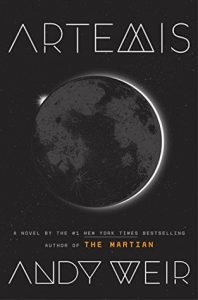Jazz Bashara is a criminal. Well, sort of. Life on Artemis, the first and only city on the moon, is tough if you’re not a rich tourist or an eccentric billionaire. So smuggling in the occasional harmless bit of contraband barely counts, right? Not when you’ve got debts to pay and your job as a porter barely covers the rent.
Everything changes when Jazz sees the chance to commit the perfect crime, with a reward too lucrative to turn down. But pulling off the impossible is just the start of her problems, as she learns that she’s stepped square into a conspiracy for control of Artemis itself—and that now, her only chance at survival lies in a gambit even riskier than the first.
Artemis. The new science fiction novel by the writer of The Martian, Andy Weir. I picked it up on Audible and hence listened to it rather than reading it. It was narrated by Rosio Dawson and ran at just under nine hours which I did in two sessions. I was greatly impressed by The Martian and a follow up for such a success would be very difficult…so..how was the story?
So, what is Artemis? It’s…a few things, actually. The top of which is, it’s heist story. On the moon. It’s not just that, of course. The protagonist, Jasmine (“Jazz”) Bashara is being offered an opportunity to change her life…we’ll get on to that shortly. What I’m saying is that, though this is a heist story, one where careful planning and unexpected reversals are the order of the day, it’s also a story about a woman looking to make something of herself, and the book is as much about character and personality as it is about chases through vacuum and dubious law enforcement.
The world well, it’s in some ways familiar, in others…less so. The moon is a harsh place, at least externally. It’s cold, dead, and the slightest mistake could kill you. There’s a certain sterile beauty to it, to be fair – but Weir has built a moon which can kill, and emphasises the fragility of life in that environment. The larger part of the world, though, is in the city which humanity has settled. It has a certain retro vibe to it – domes rising out of the moon rock, habitable areas underground as well as above. Relatively small, the cultural cadences of science and technology are interspersed throughout – this is a people who make up for their lack of numbers with intellectual capital and skill. The city bustles and thrives, and the industry around it – aluminium, for example – helps sustain it; it certainly feels both alive, and familiar – and at the same time, ever so slightly strange.
Character-wise – well, the main focus is on Jasmine. I have a lot of affection for Jazz, as she’s known – a smart-mouthed young woman, with a laser-like intelligence and an impressive facility for saying the wrong thing at the wrong time, or otherwise putting her proverbial foot in it. Still, she has a sharp tone, and a degree of hustle and charm which it’s a lot of fun to read along with. We pick up some of her history through the text. This lets us explore wider issues as well, like how parenting, or nationality work on the moon, or the role of currency in the context of moon-living. Jazz is energetic and cheerfully self-serving, and if there’s hints of larger issues there – guilt, issues with authority, family difficulties – then they help make a more nuanced character.
Jazz is backed up by a fairly large ensemble cast – from snide EVA instructors who also happen to be ex-boyfriends, to seemingly baffled scientists. Jazz’s father, a man seemingly confounded by his daughter’s ability to do absolutely anything other than apply herself, steals every scene that he’s in, with a combination of pragmatic competence and an obvious love for his daughter that pours off the page. There’s others of course – engineers in life support, and a particularly persistent lawman. I think my only complaint is that we don’t see enough of them. They’re there, and serve the plot rather well, and give Jazz the contrasts and banter in her life that we need to see – but I’d love to have seen them in more depth.
The plot…well no spoilers. But it’s a lot of fun. In some ways it’s a slow burn, as facets of a plan come together. But there’s enough going on at every stage to keep you locked in. When things do kick off, then there’s heart-in-mouth moments aplenty, tension broken with chases, brawls, and the occasional explosion. It’s a journey in exuberant prose, which is taking joy in both the science and discovery of it all, and in the personal dramas, the horrible mistakes, the bare-knuckle recoveries and the personal triumphs.
It’s not The Martian, but that’s a good thing. Artemis is strong enough to stand on its own. It’s clever, fast-paced, tense, and carries moments of sparkling humour and emotional weight. If you were a fan of The Martian, then yes, you should give this one a read. If you’re coming to Weir’s work for the first time – this is very much worth the time.
So that is my review. I must also mention that the author did an excellent job of ticking all of the diversity boxes without causing any offence which is a hard thing to do. Kudos!
GBS


